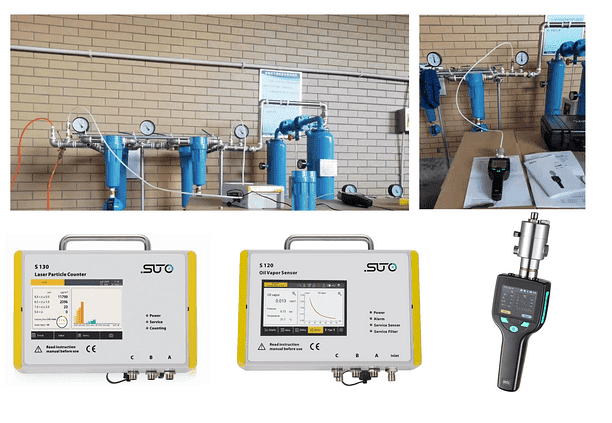
Filters are important parts in the compressed air system. After filtering, separating, and blocking, a filter separates the particles, oil vapor and other substances in the gas, keeping the compressed air in the system clean and dry.
For filter manufacturers, it is a common practice to build their own test lab in order to keep improving the product quality. In the lab, manufacturers can measure the filtration data of particles, oil, and water in compressed air using measurement instruments:
- Particle filtration efficiency: Ratio of filtered impurities to impurities in the compressed air at the air intake.
- Residual oil: Different filters have different filtering effects. The lower the oil value, the better the filtering performance.
- Water: The humidity of gas. Because compressed air has higher requirements for dryness, dew point temperature is usually used. The higher the dew point temperature, the higher the humidity.
In aim to explore the overseas market, a private air filter manufacturer in Hangzhou planned to set up its own performance lab. Combining the advice of experts in the industry and their own needs, the manufacturer identified the following selection criteria:
- Easy installation and operation, measurement data at a glance
- Accurate measurement with as few human errors as possible
- Long term stability
- Efficient after-sales and calibration services
This manufacturer finally adopted the measurement solution from SUTO. With help of SUTO technicians, the lab is set up quickly and put into use immediately. The key features of the measurement instruments help the manufacturer succeed in proving the product performance to customers and also improving the filter quality in a target manner:
- Color touch screen, easy to use without needs of complicated training.
- S505 portable dew point meter: Measures dew point, temperature, and pressure (three-in-one meter). The line pressure is measured in combination of the dew point. Measurement range: -100 … + 50ºC Td, covering the trace to standard moisture applications.
- S120 oil vapor sensor: Measures oil vapor content down to 0.003 mg / m³. PID sensor for the highest accuracy and with the capability of automatic calibration. Easy connection through sampling hoses and quick connector.
- S130 laser particle counter: Conforms to ISO8573-4 with particle size range d: 0.1 < d < 5.0 μm.

